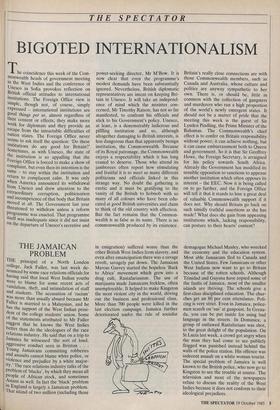THE SPECTATOR
BIGOTED INTERNATIONALISM
The coincidence this week of the Com- monwealth heads of government meeting in the West Indies and the conference of Unesco in Sofia provokes reflection on British official attitudes to international institutions. The Foreign Office view is simple, though not, of course, simply expressed — international institutions are good things per se, almost regardless of their content or effects; they make more work for diplomats and they provide an escape from the intractable difficulties of nation states. The Foreign Office never seems to ask itself the question: 'Do these institutions do any good for Britain?' Sometimes, as with Unesco, the state of the institution is so appalling that the Foreign Office is forced to make a show of complaint, but even then its intention is the same — to stay within the institution and return to complacent calm. It was only when America announced its withdrawal from Unesco and drew attention to the extraordinary corruption, politicisation and incompetence of that body that Britain moved at all. The Government last year threatened to withdraw unless a reform programme was enacted. That programme itself was inadequate since it did not insist on the departure of Unesco's secretive and power-seeking director, Mr M'Bow. It is now clear that even the programme's modest demands have been substantially ignored. Nevertheless, British diplomatic representatives are intent on keeping Bri- tain in Unesco. It will take an independ- ence of mind which the minister con- cerned, Mr Timothy Raison, has not so far manifested, to confront his officials and stick to his Government's policy. Unesco, at least, is a demonstrably ludicrous and piffling institution and so, although altogether damaging to British interests, is less dangerous than that apparently benign institution, the Commonwealth. Because of its Royal patronage, the Commonwealth enjoys a respectability which it has long ceased to deserve. Those who attend its jamborees often report how stimulating and fruitful it is to meet so many different politicians and officials linked in this strange way. No doubt the gathering is exotic and it must be gratifying to the vanity of the British to hobnob with so many of all colours who have been edu- cated at good British universities and claim to think of the old country with affection. But the fact remains that the Common- wealth is as false as its name. There is no commonwealth produced by its existence. Britain's really close connections are with those Commonwealth members, such as Canada and Australia, whose culture and politics are anyway sympathetic to her own. There is, or should be, little in common with the collection of gangsters and murderers who run a high proportion of the world's newly emergent states. It should not be a matter of pride that the meeting this week is the guest of Sir Lynden Pindling, the Prime Minister of the Bahamas. The Commonwealth's chief effect is to confer on Britain responsibility without power; it can achieve nothing, but it can cause embarrassment both to Queen and government. So it is that Sir Geoffrey Howe, the Foreign Secretary, is arraigned for his policy towards South Africa. Already the Government has modified its sensible opposition to sanctions to appease another institution which often opposes its interest — the EEC. Now it is being called on to go further, and the Foreign Office will tell it that it stands to lose a great deal of valuable Commonwealth support if it does not. Why should Britain go back on such timidly truthful assertions as she has made? What does she gain from appeasing institutions which, lacking responsibility, can posture to their hearts' content?


















































 Previous page
Previous page